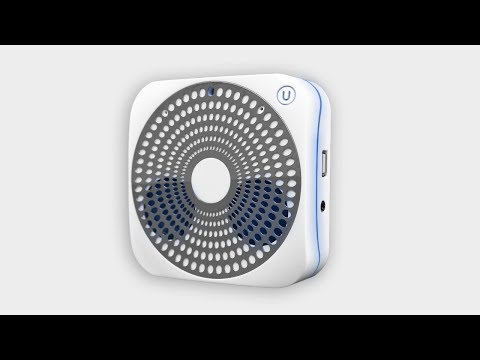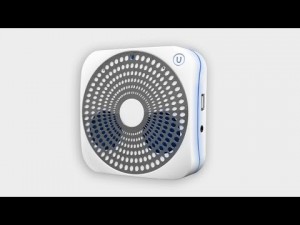May 22, 2014 – A speaker at the O’Reilly Solid Conference in San Francisco this week spoke of our robotic future with a twist. Andra Keay, Managing Director of Silicon Valley Robotics, talked about personal robots in our future. She remarked,
“By the year 2020 your household robot will be your house. Not the humanoid robot from science fiction…..we’re surrounded by robots we don’t see while we’re still waiting for the robots we imagine.”
What was she talking about? The world of microprocessors, smart devices and wireless networks. She was not talking about robot vacuum cleaners or humanoid robot servants.
That’s where Ubi – The Ubiquitous Computer comes in. Today Project Ubi is just getting started. The company is Unified Computer Intelligence Corporation. Its founders are three Toronto-based engineers with a bold vision, to create the interface of the future for home computing. While at my daughter’s wedding over a week ago I was introduced to one of the founders, Mahyar Fotoohi. I was immediately intrigued as he described what his company is attempting to do.
Ubi is a device that when plugged into a wall socket wirelessly integrates with your home network and any smart WiFi, Bluetooth or RF devices. The device doesn’t look like your typical robot but it points to the Star Trekkian future that Keay described at the conference, a technology that turns your home into the robotic aide, one that you talk to and it talks back.
To get started say “OK Ubi” and the device awakens. Ask Ubi about the weather? Ask it to look up a stock price that you are tracking? Ask it to find an answer to a question you pose. Use it to compose text or emails. Make a telephone call with it. Hook it up to your smart TV and other smart media, to your smart thermostat, and to your smart security alarm.
When the company launched itself three years ago it went on KickStarter and tried to raise $36,000. It was a little more successful than that bringing in $230,000. With 1,190 people pledging as little as a dollar and as much as $1,249 the company crowdfunded itself into business.
On KickStarter Ubi is priced at $189. That’s not very much of an investment for the potential this device represents. Here are just some of the current applications Ubi provides.
- It’s a virtual assistant keeping track of your personal calendar.
- It’s an indicator light system that alerts you to new weather information, an incoming email and more.
- It’s an extension to your home entertainment system piping sound to wherever you want it.
- It’s a speaker phone.
- It lets you search the Internet by voice.
- You can dictate memos, emails and text messages.
- You can use it to remind you that you left something on the stove or in the microwave.
- It’s a baby monitor.
- It’s a climate control device working with web-enabled smart thermostats, air conditioning systems, even air pressure and lighting.
- It monitors noise.
- It connects to Android and iOS phones and tablets.
- It offers USB connectivity for lots of other plugin devices.
What’s onboard? Ubi runs Android 4.1. It has WiFi, Bluetooth and RF transmission capability, a gigabyte of RAM, an 800 MHz ARM Cortex-A8 Processor, USB 2.0 and built-in sensors for temperature, humidity, air pressure and ambient light. All in a package that is 10 centimeters square (4″ by 4″ inches) and 2.8 centimeters high (1.1 inches).
Want to participate in the evolution of ubiquitous home computing? You can join Project Ubi Odyssey to become a tester and participate in its development.
What I would like to see Ubi do in the future is differentiate who the speaker is that is talking to it. It can then specifically tailor the information it provides to that person. It would then manage multiple calendars, keep personal, individual telephone and email lists. It would get to know every individual in the home and wouldn’t it be cool if you could customize how it sounds to meet individual preferences.
And of course as Ubi evolves it will be interesting to see just how much artificial intelligence can be incorporated into the device so that it anticipates individual needs. That would be even better than the ship’s computer interface in Star Trek.
So good luck Ubi team. You’re on to a disruptive technology that will change how humans interact with smart technology and we won’t have to wait until the 24th century to experience it.
















